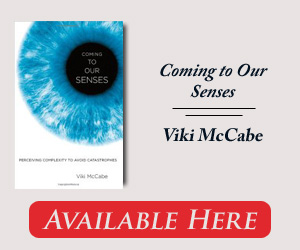Matters of Perception
Sometimes the truth lies more in what we perceive than what we think

Coming to Our Senses: Perceiving Complexity to Avoid Catastrophes, by Viki McCabe, Oxford University Press, 273 pp., $29.95
In her heartening new book, cognitive scientist Viki McCabe urges us to understand our world not through abstract words and ideas—which, she writes, merely “prune what is happening on the ground into parts to make it mentally manageable”—but through a more ancient and primordial means: our senses. She argues that our failure to do so might even be responsible for our apparent inability to address urgent global problems like climate change and inequality.
McCabe draws on scientific and anecdotal evidence to explain an obscure type of perception that most of us experience without realizing it. She first became conscious of it while watching a film that displayed a black screen dotted with tiny lights. Suddenly the lights began to move and coalesce into patterns, revealing themselves to be people walking, dancing, and doing push-ups. Their faces and bodies had been blacked out. Reflective bicycle tape fastened to each performer’s six major joints reflected light onto the screen. Despite the lack of normal clues, their movements were visible and understandable from the illuminated patterns they produced. More surprisingly, McCabe discovered that observers who knew the performers recognized them on the screen based solely on their movements. This was possible because each person’s unique proportions produce identifiable body movements. Their physical characteristics typically change over time, but their proportions remain the same, much like fingerprints, producing unique patterns of motion. This is how we often recognize people we haven’t seen in 30 years, even when their features have aged and changed.
By documenting our ability to perceive this kind of information, McCabe throws light on subjects as diverse as detecting missiles, reading body language, understanding the history behind the role of the Army Corps of Engineers in the Katrina tragedy, recognizing great quarterbacks as “perceptual experts,” seeing the structure of Japanese gardens, understanding cancer as a complex system, grasping the influence of theory in the gun regulation debate, comprehending Alan Greenspan’s role in the 2008 global economic collapse, and acknowledging the dangerous power of the Goldman Sachs commodities index fund, which the company used to corner the wheat market, causing the starvation and food riots that contributed to the end of President Mubarak’s reign in Egypt.
 McCabe describes agricultural practices at Polyface Farm in Virginia, where Joel Salatin mimics rather than discards “Earth’s natural processes”—for instance, by replenishing the soil with manure from the animals he raises, thereby offering glimpses into the possibility of finding our way beyond theories and practices that contribute to escalating disasters like climate change. Take McCabe’s account of the traumatic introduction of the potato, a South American staple, to Europe by returning Spanish conquistadors. Peruvian farmers combated potato blight by cultivating 500 different varieties in hills of soil. But conquistadors took with them only a few potato varieties on their return voyages across the Atlantic, where the reigning agricultural theory promoted open-field planting (to maximize the harvest) in flat fields without adequate drainage. The result was widespread potato blight, crop failures throughout Europe, and the devastating Irish potato famine. Industrial potato farming methods today are still shaped by the open-field theory and continue to be vulnerable to failure.
McCabe describes agricultural practices at Polyface Farm in Virginia, where Joel Salatin mimics rather than discards “Earth’s natural processes”—for instance, by replenishing the soil with manure from the animals he raises, thereby offering glimpses into the possibility of finding our way beyond theories and practices that contribute to escalating disasters like climate change. Take McCabe’s account of the traumatic introduction of the potato, a South American staple, to Europe by returning Spanish conquistadors. Peruvian farmers combated potato blight by cultivating 500 different varieties in hills of soil. But conquistadors took with them only a few potato varieties on their return voyages across the Atlantic, where the reigning agricultural theory promoted open-field planting (to maximize the harvest) in flat fields without adequate drainage. The result was widespread potato blight, crop failures throughout Europe, and the devastating Irish potato famine. Industrial potato farming methods today are still shaped by the open-field theory and continue to be vulnerable to failure.
This beautifully written, persuasively documented book seems to call for a sequel in which McCabe would show how our culture might look if we began to take seriously the task of imitating nature’s processes instead of imposing our own. In her epilogue, she proposes a challenging first step: working to restore the commons—the soil, water, air, trees, plants, and animals we have been busily privatizing and polluting with little regard for the fact that these shared resources have supported all human life since it began. If we do what McCabe proposes, we might rediscover the same sort of harmonious relationship with Earth so powerfully experienced by indigenous people the world over. As McCabe gently reminds us, Sir Francis Bacon, father of the scientific method, wrote in 1623: “All depends on keeping the eye steadily fixed on the facts of nature, and so receiving the images as they are.”

